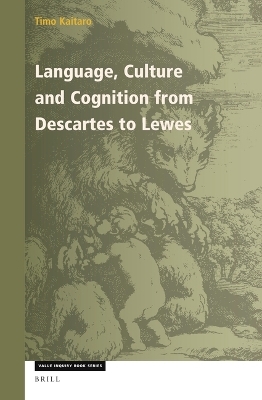
Language, Culture and Cognition from Descartes to Lewes
Brill (Verlag)
978-90-04-50723-4 (ISBN)
This volume describes how the significance of language and culture in forming human cognition has been understood from the mid-sixteenth century to the mid-nineteenth century. It discusses thinkers who realized that the human mind—and brain—is in fact a cultural artefact and that language is not merely a means to communicate thoughts, but also to form them in the first place. It presents a novel perspective on the history of philosophy in which the narrative is no longer centered on the question of whether knowledge results from experience or reason, but whether experience and reason are in fact possible without language.
Timo Kaitaro, Ph.D. (1995), is a neuropsychologist and adjunct professor of the history of philosophy at the University of Helsinki. He is the author of Diderot’s Holism (Peter Lang, 1997) and Le Surréalisme: Pour un réalisme sans rivage (L’Harmattan, 2008).
Preface
Acknowledgements
Introduction
part 1
From the Institutions of Nature to Symbolic Cognition
1 The Natural and Artificial Body in Cartesian Philosophy
1 Descartes and the Bodily Institutions
2 La Forge and Malebranche
2 Hobbes and the Citizens of the Realm of Truth
1 From Marks to Signs
2 Access to the Realm of Truth
3 From Ideas to Representations
3 Locke: Combining Ideas with a Little Help from Words
1 The Portion of Nature
2 The Architecture of Ideas
3 The Role of Language in Human Understanding
4 Distinctions Created by Human Institutions
4 Leibniz, Wolff, and Symbolic Cognition in the German Tradition
1 Leibniz
2 Christian Wolff
part 2
The Natural and the Artificial Human during the Enlightenment
5 Daniel Defoe and the Wild Boy
6 Hume and the Artificial in Human Understanding
1 The Natural Mechanisms of Human Nature
2 Personal Identity
3 Passions and Nature
4 Vice, Virtue and Taste
5 Morals and the Artificial Nature of Humans
7 Condillac and Diderot on the Role of Artificial Signs in Cognition
1 Locke’s Error
2 Needs, Will and Social Interaction
3 The Architecture of Memory
4 After the Essai
5 The Problem of Inversions
6 Diderot and the Deaf
7 Languages as Methods of Analysis
8 The Discursive Order and the Art of Reason
8 La Mettrie: Man as an Artefact
1 Man a Machine
2 Homo Duplex
9 The Nature of Morality: Diderot, Helvétius and Rousseau
1 Diderot and the Vices and Virtues of Nature
2 Helvétius vs. Diderot
3 Rousseau
4 Condillac and the Natural Needs
10 Maupertuis and the Debates in the Berlin Academy
1 Maupertuis and the Lack of Correspondence between Language and Ideas
2 The Debates at the Berlin Academy
11 Herder: From the Language of a Silent Loner to Human Perfection
1 Men and Animals
2 The Word as Recognition
3 Sounds and Other Sensations
4 The Innateness of Language Ability
5 Herder, Hamann and Kant
12 Hamann and the Primacy of Language and Tradition
1 The Problem of Word Order
2 The Origin of Language
3 The Transcendental Perspective
part 3
The Condillacian Heritage and Beyond
13 The Idéologues: The Semiotics and Physiology of Culture
1 Cabanis’s Social Physiology
2 Sensations and Language
3 Nature and Art
4 Holistic Organicism
5 Destutt de Tracy’s Ideology: Back to the Lockean Order, with a Twist
6 Sensing and Thinking
7 Thought and Language
8 Language as Calculus
9 Maine de Biran and Signs in Action
10 From Impressions to Ideas
11 Imagination, Language and Memory Again
12 Mind Playing Hide-and-Seek with Itself
13 Reclaiming Passions by Signs
14 The Two Sciences of Man
15 Maine de Biran and the Condillacian Tradition
14 The Divine Origins of Language
1 Süßmilch’s Proof of the Divine Origin of Language
2 Bonald and Language as the Deliverer of Ideas
3 Animals and Humans
4 The Impossibility of Inventing Language
5 Bonald and Condillac
15 Back to the Institutions of Nature: Gall and Spurzheim
1 Faculties and Organs
2 Men and Animals
3 Language and ideas
16 Humboldt: Language and the Creation of National Character
1 Concepts and Language
2 The Origins and Development of Language
3 Overcoming the Limits of Language
4 The Perfection of Language by Inflection
5 The Holistic Nature of Language
6 Nationality, Individuality and Language
7 Writing as the Analysis of Language
8 Humboldt and His French Predecessors
17 G. H. Lewes and Symbolic Thought
1 The Social Organism
2 Ideation as the Algebra of Feeling
3 From Sensations to a Historical a Priori
Conclusions: From the Institutions of Nature to History and Culture
1 Words and Ideas in the Empiricist Tradition
2 Symbolic Thought and Sensation
3 Language, Nature and Society
4 From Collections to Structures – From Individuals to Historical Wholes
5 Language, History and Nationhood
6 Telling a Different Story on the Origin of Ideas
Appendix Translations of French and German Quotations (by the Author, Unless Otherwise Indicated)
Bibliography
Index
| Erscheinungsdatum | 09.03.2022 |
|---|---|
| Reihe/Serie | Value Inquiry Book Series / Cognitive Science ; 375 |
| Verlagsort | Leiden |
| Sprache | englisch |
| Maße | 155 x 235 mm |
| Gewicht | 689 g |
| Themenwelt | Geisteswissenschaften ► Philosophie ► Philosophie der Neuzeit |
| Geisteswissenschaften ► Philosophie ► Sprachphilosophie | |
| ISBN-10 | 90-04-50723-X / 900450723X |
| ISBN-13 | 978-90-04-50723-4 / 9789004507234 |
| Zustand | Neuware |
| Haben Sie eine Frage zum Produkt? |
aus dem Bereich


